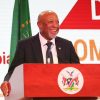Omanyano ovanhu koikundaneki yomalungula kashili paveta, Commisiner Sakaria takunghilile
Veronika Haulenga
Omanyano ovanhu koikundaneki yomalungula kashili paveta, Commisiner Sakaria takunghilile
Veronika Haulenga
Listeners:
Top listeners:
-
play_arrow
Omanyano ovanhu koikundaneki yomalungula kashili paveta, Commisiner Sakaria takunghilile Veronika Haulenga
Statement by Principals of the Inter-Agency Standing Committee on the Democratic Republic of the Congo
[[{“value”:”
Escalating conflict is driving record levels of gender-based violence, displacement and hunger in the eastern part of the Democratic Republic of the Congo (DRC), threatening to push the country to the brink of catastrophe without urgent international action.
Decades of conflict and the resulting humanitarian emergency have already exhausted and traumatized millions of civilians. In the last few months alone, more than 700,000 people have been forced to flee their homes, bringing the total number of displaced people to an all-time high of 7.2 million.
Ensuring that sufficient aid reaches civilians in need swiftly and without impediment is critical. But this year’s Humanitarian Response Plan is woefully underfunded, with just 16 per cent of the $2.6 billion needed having been received. The gap between rapidly rising needs and sufficient resources means millions of people are left without the lifesaving support they need.
This lack of resources is compounding the crisis by forcing humanitarian organizations to curb their assistance, with women and girls paying a devastatingly high price. Minimal protection and security in crowded displacement camps means many are forced to exchange sex for survival and support for their families. When they venture outside to collect firewood, water or for work, they are also exposed to appalling levels of sexual violence.
Gender-based violence has surged to unprecedented levels, with recorded cases surging between 2022 and 2023. Stigma and the fear of retaliation prevent many survivors from coming forward. In addition to sexual violence, children are also at risk of other threats, including abduction, killing, maiming and recruitment by armed groups.
Perpetrators of human rights violations must be held accountable for their crimes. Under international humanitarian law, civilians must be protected.
More than 25 million people – a quarter of the population – continue to face crisis or emergency levels of food insecurity in the DRC, a country facing one of the world’s largest food crises. Cholera and measles are also spreading rapidly as the health sector continues to deteriorate. Climate extremes worsened by El Niño are yet another threat for already struggling families.
Bringing an end to the escalating humanitarian crisis in the DRC requires addressing its root causes: conflict, the exploitation of natural resources, illicit financial flows, prevailing gender inequality and development deficits.
We must step up our support to the Congolese people, including to women and girls who are bearing the brunt of this conflict, as they work to rebuild their lives and livelihoods and return to their homes. The international community must mobilize additional resources for the humanitarian response and support for civil society organizations – as well as the political will to end the violence once and for all.
Distributed by APO Group on behalf of United Nations High Commissioner for Refugees (UNHCR).
“}]]
Similar posts
Windhoek Weather
Most popular

Mbumba signs off new benefits for retired political office bearers

Former FNB employee arrested after defraud pensioner off N$215, 000

Namdia Heist: More questions, lots of confusion

Omuhwahwameki Michael okuunganeka oshikonga shoku patitha oostola dho Rani moshilongo ashihe.

Walvis Bay woman loses over N$777.000 to a fraudster
Copyright 2025 Future Media (Pty) Ltd | Website by Digital Platforms
Tel: +264 83 000 1000 | Email: news@futuremedia.com.na



